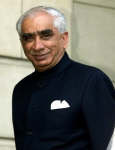Home > Business > Budget 2003-2004 > Report
Jaswant's message: invest and grow
BS Bureau in New Delhi |
February 28, 2003 17:34 IST
Growth and investment seem to be the driving forces of Jaswant Singh's maiden budget for 2003-04.
 He has sought to achieve this through two broad initiatives: by catalysing investment in infrastructure with an ambitious Rs 60,000 crore programme, and by putting more money in the hands of consumers through tax concessions.
He has sought to achieve this through two broad initiatives: by catalysing investment in infrastructure with an ambitious Rs 60,000 crore programme, and by putting more money in the hands of consumers through tax concessions.
Underscoring this new emphasis is the finance ministry's India development initiative which is being given a corpus of Rs 200 crore to promote India as both a production and an investment destination.
In services, the decision to raise the foreign investment cap to 74 per cent in private banks could also improve the country's attractiveness to global banks.
To be sure, the infrastructure investment plan involves an initial contribution of only Rs 2,000 crore from the centre. But the finance minister, riding on the success of the Golden Quadrilateral programme, is seeking to lure in more public participation in infrastructure through innovative funding mechanisms.
With this he hopes to:
Start work on 48 new road projects running into 10,000 km at an estimated cost of around Rs 40,000 crore; a quarter of them will be laid with cement concrete.
Encourage investment in National Rail Vikas Yojana projects worth Rs 8,000 crore.
Renovate and modernise two airports at Mumbai and Delhi, and two western seaports at Nhava Sheva (New Mumbai) and Kochi at a cost of Rs 11,000 crore.
Establish two global-standard international convention centres at an estimated cost of Rs 1,000 crore.
In addition, the North-South and East-West corridors of the Golden Quadrilateral road project will be funded through an additional levy of 50 paise per litre of diesel and petrol.
This levy will contribute a further Rs 2,600 crore for road development.
These 48 road projects basically involve four-laning in areas of high traffic.
They will be funded on a build-operate-and-transfer (BOT) basis, with the government providing an annual subsidy to bridge the shortfall between anticipated revenue and loan repayment liabilities.
In the first year, 2003-04, at least 3,000 km of roads will be taken up for four-laning.
The raiway projects will be funded through a special purpose vehicle that will take up projects worth Rs 8,000 crore for the Golden Quadrilateral.
These projects will be funded through Rs 3,000 crore worth of government equity, and Rs 5,000 crore of loans.
This SPV will raise debt from the market, with repayment being done by earmarking railway receipts for it.
The Delhi and Mumbai airports are to be modernised as the principal hubs of international travel to and from India.
Two separate companies, which could take on joint venture partners, will be formed with initial equal equity participation from the Airports Authority of India.
On completion, the management of the airports will be leased out to private parties.
As for ports, the Jawaharlal Nehru Port Trust (JNPT) at Nhava Sheva (New Mumbai) and Kochi port are to be brought up to international standards at a cost of Rs 7,500 crore.
The user charges levied by the two port authorities are expected to be adequate to cover the debt service obligations.
Here, too, the government will provide funding only to bridge the gap between revenues and debt servicing costs.
The other two measures intended to encourage investment in infrastructure are the one for rural roads, which will be funded by earmarking half the proceeds of the diesel cess, and the continuation of the sops for housing.
The finance minister made it clear that the Rs 1.5 lakh deduction available on housing loan interest to borrowers was helping the construction, steel and cement sectors - and he had no reason to rock the board.
In addition, the finance minister proposed that income from housing projects for the construction of residential units of prescribed specifications, and which are approved by the local authorities up to March 31, 2005, will now be exempt from tax.
This will enable investment in urban housing infrastructure and slum upgradation.
The decision to restore the leave travel concessions to government employees is still another measure to encourage people to spend - and this time it is the tourism industry that should benefit.
Add the excise cuts on cars, air-conditioners and other durables, and the message is clear: both government and people must start spending to keep the growth engine from stalling.
Powered by 